
Exposé Online
What's old
Exposé print issues (1993-2011)
- 1 (October 1993)
- 2 (February 1994)
- 3 (May 1994)
- 4 (August 1994)
- 5 (October 1994)
- 6 (March 1995)
- 7 (July 1995)
- 8 (November 1995)
- 9 (March 1996)
- 10 (August 1996)
- 11 (February 1997)
- 12 (May 1997)
- 13 (October 1997)
- 14 (February 1998)
- 15 (July 1998)
- 16 (January 1999)
- 17 (April 1999)
- 18 (November 1999)
- 19 (May 2000)
- 20 (October 2000)
- 21 (March 2001)
- 22 (July 2001)
- 23 (December 2001)
- 24 (April 2002)
- 25 (September 2002)
- 26 (February 2003)
- 27 (August 2003)
- 28 (December 2003)
- 29 (April 2004)
- 30 (September 2004)
- 31 (March 2005)
- 32 (September 2005)
- 33 (May 2006)
- 34 (March 2007)
- 35 (January 2008)
- 36 (October 2008)
- 37 (July 2009)
- 38 (July 2010)
- 39 (Summer 2011)
Features
Is Performing in a Cock-Fighting Ring a Secret Worth Keeping? —
The Sam Arnold Interview
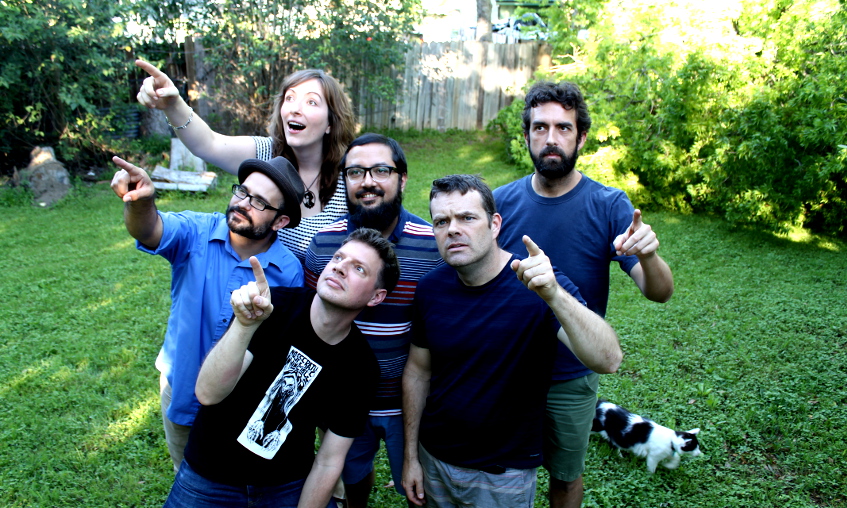
Another of Austin’s best-kept musical secrets in its growing community of musicians who are constantly pushing boundaries is progressive art rock musician Sam Arnold. Here is another chapter in Exposé’s continued efforts to bring this music to a larger audience. I’ve had the pleasure of reviewing Sam Arnold’s efforts with Opposite Day and his new project Sam Arnold and the Secret Keepers. So I wanted to learn more about the man behind the music.
by Henry Schneider, Published 2017-06-30
Would you please provide a brief overview of your career and the bands you’ve played with?
After graduating college and enduring too many cold winters in Michigan, I moved to Austin in 2001 in order to be a rock star. I spent the first couple of years bouncing between paid gigs with country and cover bands, but always had several artistic projects happening, notably Opposite Day. In 2006 I got a nice day job that allowed me to quit everything that was not artistically rewarding. So in the last decade I got involved with super cool bands like Sweetmeat, Sarah Sharp, Lick Lick, Stop Motion Orchestra and of course my solo stuff and Opposite Day. I released my first solo album in 2007, and since it was fun - and thanks to Greg Yancey's engineering and studio resources, easy and cheap - I just kept making albums. In 2011, I decided to make a 4-part series, releasing one disc a year through 2014. When I played these songs live, I got various people together that kind of over time congealed into Sam Arnold and the Secret Keepers. We put together the new album based on those folks coming together.
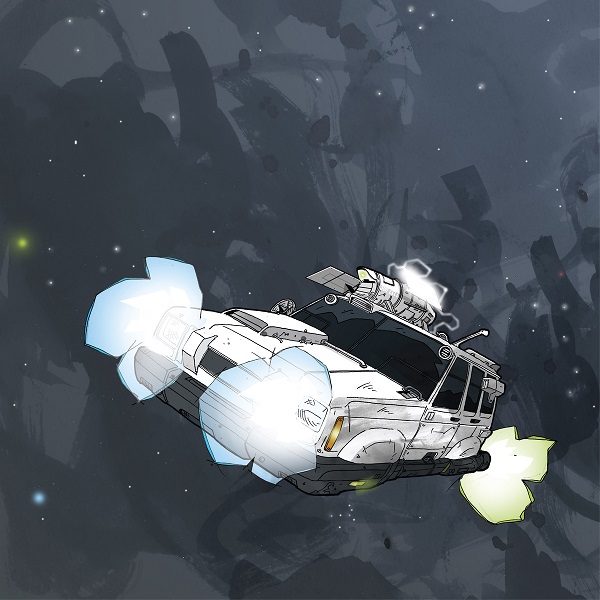 What did you get your degree in? A lot of the references in Space Taste Race show knowledge of physics and astrophysics.
What did you get your degree in? A lot of the references in Space Taste Race show knowledge of physics and astrophysics.
I watch a lot of astronomy documentaries and listen to Neil DeGrasse Tyson's podcast constantly. I also read a ton of sci-fi. I think maybe I should have done science in college, but I did political science, which is not very scientific. I wish people did politics more scientifically! But I hate political music.
What is your day job? And how does it enable you to pursue your music?
I'm a recruiter for a marketing firm. I hire a few people and reject everyone else. Recruiting is hard work, but it tends to accommodate a flexible schedule and my colleagues are very supportive of my "other" career as a dirty musician.
What was your earliest musical experience?
I guess I was always writing riffs and stuff in high school alternative, metal, reggae, and punk bands since I was like 15 or something. But the experience that made me want to be a professional musician was during a clinic in the college jazz band. It was the first time I got to play with some musicians who were a lot better than me. It felt amazing to just keep my head above water with great players. I knew I wanted more of that.
Growing up, who was more interested in music, your Mom or Dad? What music did they expose you to in your formative years?
My parents were very encouraging, but their tastes didn't really seep into me. I got my musical foundations from friends. My mom is an author, my dad is an actor, and my sister makes documentaries for the BBC. We get along great but musical taste is not one of the things that brings us together. They were not the kind of parents one would rebel against, but I think I felt the need to find my own separate identity as a musician. Only much later did we find any common ground on our musical interests, like in my 30s when I started to appreciate classical music and the unimpeachable songwriting of Rogers and Hammerstein. I think my family has appreciated slightly less than half of the music I make, which is fine with me.
What do you remember as your first exposure to progressive rock and psychedelia?
Probably the earliest albums I got that could be considered "weird" were Faith No More’s Angel Dust and Living Colour’s Time's Up. This paved the way to Mr. Bungle, Fishbone, and Vijaya Anand shortly after. To me "progressive" has always been an adjective that could describe any kind of music, but I've never really cared about it as an identifiable genre of music. I think I always liked music that pushed boundaries whether it was considered "prog" or not. I'm sure I have way less prog cred than most of the people you might interview here.
Here is an off-the-wall question. If the Spanish Inquisition came to your house and demanded that you give them a description of the music you make, what would you say?
Hey fellas. I'm not sorry about blaspheming. You just need to get over it. But don't kill me! I have so much more prog, metal, electronic, Americana, exotica, experimental jazz to make! Also, if you torture me, I'll make the experience into a song, and you might feel guilty when you listen to it.
What music do you love to listen to?
In the last couple of years it's almost all Technical Death Metal (Italians are the best, especially Hour of Penance), Classical (romantic era and later — Ravel is the best), and stuff I'm working on myself. I often mix it up with my friends' bands and international folk music. I studied abroad in Senegal, so I have a soft spot for African folk and pop.
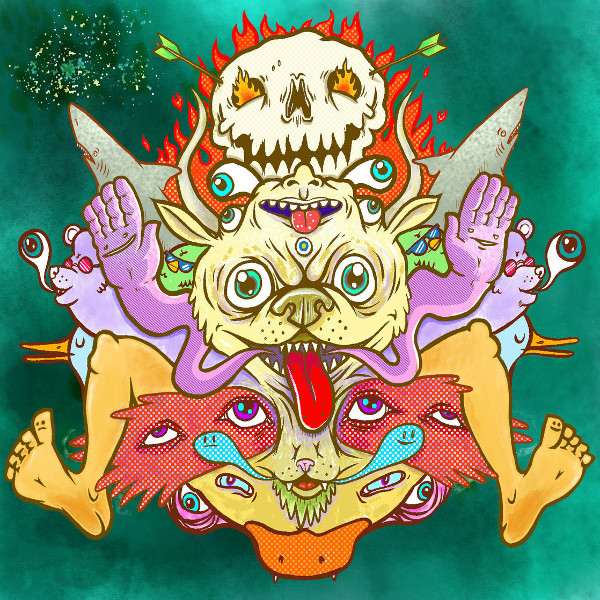 If you had to choose from your favorite of all your recordings, what would they be?
If you had to choose from your favorite of all your recordings, what would they be?
I honestly think that Listen to your Mind is my strongest album as a songwriter and producer. But I don't even try to compete with the Opposite Day stuff, which is more about the visceral "band" experience. I think Opposite Day's best album is our most recent as well, Space Taste Race Part 2.
What music do you hate? Why?
I like a lot of music that's sad, dark, evil, or even dystopian but not when there is complaining. I think Elvis Costello is totally brilliant melodically, but he as a lot of songs where he's like "this person is so dumb.” Oh, I have plenty of bitter complaints, but why put them into song form? Also, I hate music where the narrator seems un-ironically innocent. No one is innocent. No emotion or thought is pure. Any simplicity that does not open the door to deeper complexity is a lie. It implies that evil is special or external. It is neither. I guess it comes down to this: art should expand the circle of compassion, not shrink it. We all contain good and bad. No sense in dividing us into groups.
How have your musical tastes changed over the years?
Hugely. I've always liked aggressive progish rock (Living Colour, Soundgarden, Faith No More, and Fishbone have been my favorites since forever), but I've had periods of obsession with Funk, Reggae, Jazz, Jazz fusion, and Americana-type stuff like Linda Ronstadt, Mike Nesmith, Wilco, Frank Black and the Catholics and Neko Case. Since living in Africa in 1999, I've consciously immersed myself in every sort of international music I can find - my wife's and my collection is organized by region, and we've got music from almost every country. Death Metal started with Cannibal Corpse's Gallery of Suicide (1998) which I found late, in the early 2000s, and grew from there into more technical (and less gory) directions. I've only been really crazy about Classical music for the past two years or so. Right now I'm deep into the sort of soundtrack music that bands like the Baffles and Invincible Czars play, especially the dark horror themes. I'm working on some electronic music in that vein right now.
I’ve heard a lot about the Invincible Czars from Xander Rapstine. And I recently found two of their CDs in the Austin Public Library: Fortissimo and 1812 Overture. They have an interesting no-frills take on classical music, kind of a polished amateurish performance. Not at all like the bombastic “look at me perform” ELP approach. Is that what you are now exploring as well?
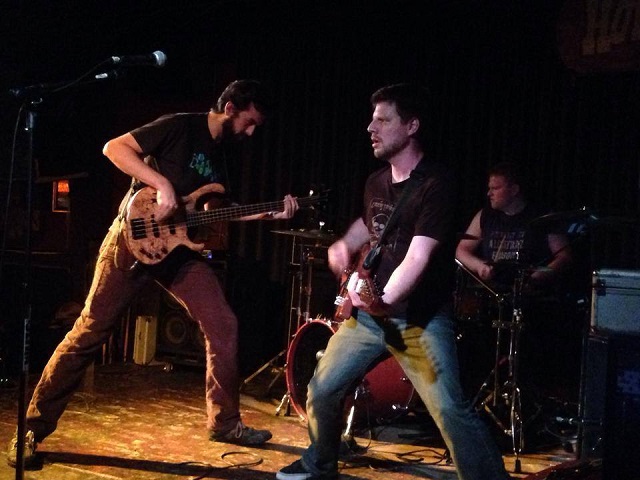 Xander's band is awesome too, Proud Peasant. I want to do a show with them! I'm sort of going every direction at once, which is probably not good for my personal musical brand. When you hear the new Opposite Day stuff, you'll see what I mean. It's pretty over-the-top. I am presently obsessed with Zappa's Jazz from Hell and am playing around with programmed jazz in my home recordings. Lots of frills there! But I am still drawn to ominous film score music in the vein of Goblin, John Carpenter. Another big current influence is Brown Whornet, whom I got to play with a few weeks ago. I blogged about it here. And Peter Stopschinski is my hero.
Xander's band is awesome too, Proud Peasant. I want to do a show with them! I'm sort of going every direction at once, which is probably not good for my personal musical brand. When you hear the new Opposite Day stuff, you'll see what I mean. It's pretty over-the-top. I am presently obsessed with Zappa's Jazz from Hell and am playing around with programmed jazz in my home recordings. Lots of frills there! But I am still drawn to ominous film score music in the vein of Goblin, John Carpenter. Another big current influence is Brown Whornet, whom I got to play with a few weeks ago. I blogged about it here. And Peter Stopschinski is my hero.
If you could cover any song, what would that one song be?
I played Joni Mitchell's "Same Situation" at the Texas Capitol in early May, and that was very gratifying. I had Lyme disease last year. The Lyme disease rally organizers requested a Joni Mitchell song because she has Morgellon's, a similar disease, and that one is my favorite of her songs. A total gender-bender and weird song for a dude to sing one octave lower.
What was your most bizarre experience playing in a band?
One time Opposite Day played in a cock-fighting ring in Kansas. There were no fighting birds when we were there, but it was a very sketchy basement situation.
A cock-fighting ring? How on earth did you get booked into that? How many people were in the audience? This conjures an image of low ceilings, dirt floors, bird dander and guano, and lots of smoke.
It was a dud show, but we needed a gig in between some other gigs. I think we played to the other band. And the ghosts of some fallen chicken warriors.
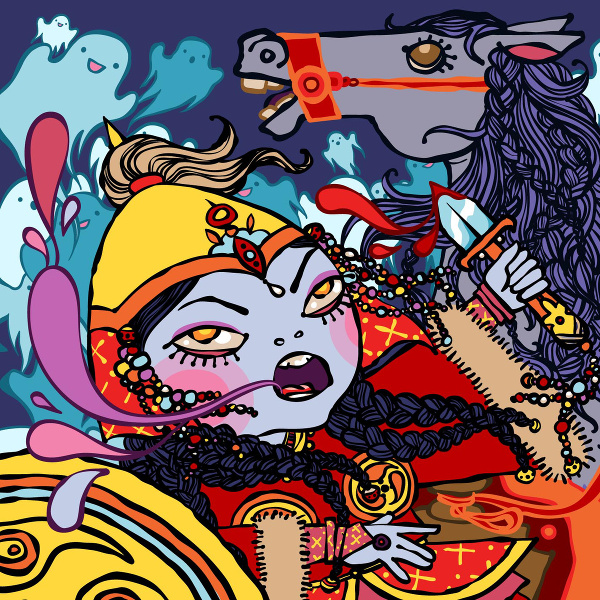 Any particular mishaps or triumphs when you were recording in the studio?
Any particular mishaps or triumphs when you were recording in the studio?
All successful recording is a triumph. I used to get very impatient in the studio and was kind of a dick to people at times. So I think that counts as a mishap.
If you had a time machine and could travel to any time or place to make music, where would you go and why?
Today is the best time and place to make music. We have so many affordable tools to create, record, and distribute our ideas. Austin is a pretty great place too, but I'm sure others are also great. I'm partial to the musicians and listeners of this town for obvious reasons.
There was something special about what was happing right around the time I was born (other than me of course!). 1977-79 was a great time for music. It was generally a great period for Talking Heads, Funkadelic, the Police, Joni Mitchell, Bob Marley, Jaco Pastorius, Adrian Belew, Frank Zappa... also Fishbone was just being formed and new wave wasn't as poppy yet. Maybe it was a time in history for musicians to find a unique balance between inward and outward awareness. Or maybe I just like how recordings from that era sound.
What is the most unusual instrument you either play, wish you could play, or like to listen to?
I have an unusual (only fifteen in existence I think) mini guitar built by Diz Jeppe. Here's a video of me playing it.
I wish I could play the dombra. Uzbekistan has cool folk music.
Where do you draw your inspiration from for your music? Who or what is your muse?
I'm a nomadic species with a wide range. If I graze too much in one place, it will never grow back. But generally, it's some combination of caffeine, sitting with a notebook, guitar, a midi keyboard, and/or a computer.
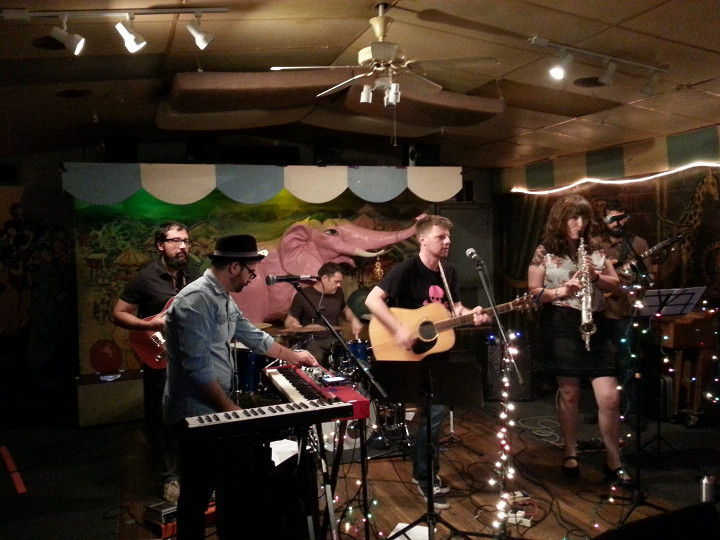 So once you are inspired to create, what happens next? Are you on you own? Or do you involve your bandmates?
So once you are inspired to create, what happens next? Are you on you own? Or do you involve your bandmates?
All of the above. I love to collaborate in various ways. With the Secret Keepers stuff, Andy Nolte (keyboardist) provided the foundational idea for three of the songs on the recent album (and many more I'm still working on). The other players always add a lot to the arrangements as well, but generally that's after the songs are pretty much written. I'm looking forward to finding new ways to write with these folks. Leila Henley (woodwinds and vocals) and Mohadev (electric guitar) are unstoppable geniuses and I want to collaborate even more with them on writing and arranging.
How long does it typically take from inspiration to a final song?
To me it's only "final" once it's recorded. So I may be changing lyrics even after everything else is completely recorded and mixed. But from the germ of an idea to something that sounds like a "song,” I need about an hour. Sometimes that hour is spread out over a couple years, but I do tend to write lots of songs very quickly rather than perfect one at a time. I wrote forty-eight songs in May, though my goal was one hundred, and they all still need a lot of work. And I still have some rehearsals and gigs and a day job... I have at least one gig a month this summer.
Do you score the music? Can all of your band mates read music? Or do you just play by ear until you and the band are happy?
Everybody reads, but doesn't really need to. Listening is the key. The Secret Keepers are a great group of people to play with because with only a few written counter-melodies and bass lines, I just give them the chord charts and they find a part that works. I enjoy having a song evolve based on the reality of our surroundings. That's my goal with playing these songs live with a band. Let great players take it somewhere slightly different each time, and adapt to make it sound ideal in the moment.
What is the meaning of the cover art for Listen to Your Mind?
You'd have to ask Brian MacLaskey about that. I've always loved his work. I just gave him an early mix of the album, $400, and absolutely no direction. My mom says she can't look at the cover. It does kind of look vaguely obscene, huh? I fully support this work, but cannot claim ownership for any of its ideas. Brian is a crazy genius and a pro. For previous albums, Alicia Traveria did a similar thing for me. She just went with it and took it to some new (and sometimes dark) places! Since I spend almost no money to record, mix, and master (thanks Greg!), I can put all the funds into getting a great local artist to lend some cred to my stuff!
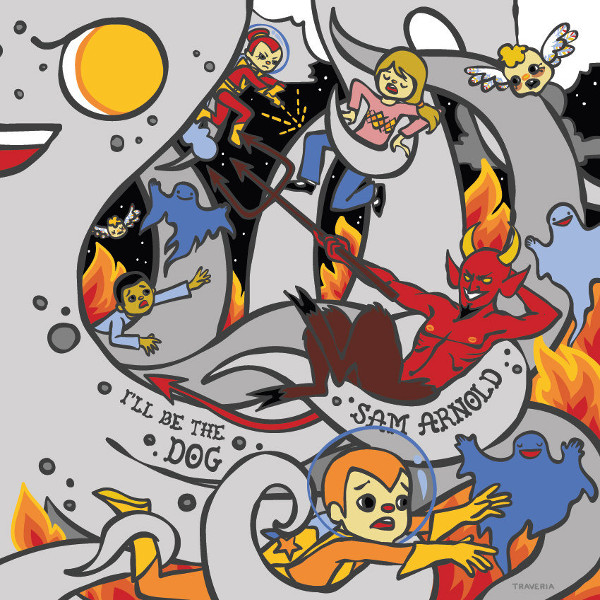 I must say that I am very impressed with Listen to Your Mind. Leila’s woodwind work is amazing! Everything sounds so effortless. How long did it take for you and the band to sound so relaxed on these deceptively simple songs?
I must say that I am very impressed with Listen to Your Mind. Leila’s woodwind work is amazing! Everything sounds so effortless. How long did it take for you and the band to sound so relaxed on these deceptively simple songs?
Thanks! Yes. Leila's a genius. I'm just constantly surprised she wants to play with me — she could be in any band she wants. The record was a very studio-driven process. We worked on a few songs together before the recording, but mostly, we started with my acoustic demos with fake drums. Then Andy's keyboard demos. Then we recorded the real drums, acoustic, and bass, and we kept most of the keyboard demos because everyone was pretty tight with the click. The production process was really all about starting with too much stuff, and then digitally moving everyone's various parts around in order to let the songs breathe. Andy was especially instrumental in the arrangement iteration/subtraction process. So I guess we put a lot of effort into making it sound effortless! I sincerely appreciate your listening to it.
And thanks to you Sam for a great interview and insight into your creative process!
Filed under: Interviews
Related artist(s): Proud Peasant, Stop Motion Orchestra, Opposite Day, Sam Arnold / Secret Keepers
What's new
These are the most recent changes made to artists, releases, and articles.
- Review: The Adelaidean - Nine Breaths
Published 2026-02-15 - Release: Maledictis - Echoes of Consciousness
Updated 2026-02-14 23:32:42 - Artist: Maledictis
Updated 2026-02-14 23:26:54 - Release: Falter Bramnk - Vinyland Odyssee
Updated 2026-02-14 00:25:55 - Review: Pier Niccolò "Bambi" Fossati - ...Il Castello Tira Sassi...
Published 2026-02-14 - Review: Balloons for the Dog - Wicked Forms of Old Snow
Published 2026-02-13 - Release: Evergrey - Architects of a New Weave
Updated 2026-02-12 19:15:23 - Release: Richard Barbieri - Hauntings
Updated 2026-02-12 19:13:57 - Release: Major Parkinson - Valesa II: Viva the Apocalypse!
Updated 2026-02-12 19:11:44 - Review: Michael Brückner - A Sequence of Colours
Published 2026-02-12 - Release: Tenk Van Dool / Paul Sears - Basal Ardor
Updated 2026-02-11 23:59:30 - Release: Craig Padilla & Marvin Allen - Unfolding Skies
Updated 2026-02-11 23:53:32 - Review: Michael Moorcock & the Deep Fix - The New Worlds Fair (50th Anniversary Edition)
Published 2026-02-11 - Review: Denman Maroney Quintet - Umwelt
Published 2026-02-10 - Listen and discover: Take flight with Steve Roach
Published 2026-02-10 - Review: Ubiks - Ciudad Sumergida
Published 2026-02-09 - Release: Fabio Anile - Minutiae
Updated 2026-02-08 00:46:44 - Artist: Fabio Anile
Updated 2026-02-08 00:42:58 - Review: Schizo Fun Addict - Pasteline Dream
Published 2026-02-08 - Release: Tom Salvatori - Lullaby for Jude
Updated 2026-02-07 19:52:27
